Smt Nirmala Sitharaman Hon'ble Minister of Finance and Corporate Affairs rings Closing Bell at NSE to celebrate 25 years of democratizing Capital Market in India
Times of India
NSE chief asks Nirmala Sitharaman to lower taxes to boost investment flows
PTI | 5 November 2019
MUMBAI: India's top equity bourse NSE's head Vikram Limaye on Tuesday said a multitude of taxes is making domestic markets uncompetitive, and appealed the government to reduce the same to help investment flows.
He said the securities transaction tax, capital gains tax, stamp duty and goods and services tax on capital market transactions are hurting India as compared to peer markets.
He made the comments amid a deepening slowdown in economic growth which has plummeted to six-year lows and a slew of measures being taken by the government to revive the same. In recent days, there have been conflicting media reports over whether the government is abolishing dividend distribution tax, securities transaction tax and long- term capital gains tax on shares.
"A streamlined tax structure would significantly enhance the attractiveness of our markets and wider participation would enhance liquidity across securities," Limaye said at an event to commemorate NSE's 25 years, in presence of finance minister Nirmala Sitharaman.
He said India is full of aspirational small businesses who will be requiring growth capital and the presence of a large pool of investors is a necessary pre-condition for meeting their aspirations.
"I request the finance minister and chairman Sebi to examine the overall transaction costs including taxes, margins and compliance costs to improve the competitiveness of Indian markets. This would also facilitate an increase in our weightage in global indices which would attract more foreign capital," Limaye said.
He said it is important to enhance institutional participation in markets by giving them seamless access to a variety of products to earn higher returns or manage risks more efficiently.
"A comprehensive review of institutional participation in equities, equity derivatives and corporate bond markets should be undertaken to better align regulation and risk parameters to facilitate greater involvement of pension funds, insurance companies, banks and mutual funds in markets," Limaye said.
He also pitched for a Pradhan Mantri Jan Dhan Yojana (PMJDY) like scheme to open demat accounts to trade in shares, where investors will be able to open accounts just using a bank account and Aadhar number.
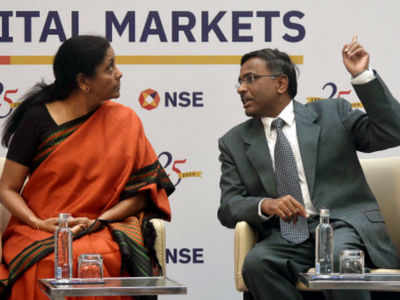
Financial Express
Tech revolution: Blockchain can transform trading, says SEBI chief
Bureau | 6 November 2019
The capital markets regulator chief was addressing an event commemorating the silver jubilee of the National Stock Exchange (NSE), which has become a market leader since its inception and controls two-thirds of volumes by disrupting the 144-year-old BSE back with its electronic screen-based trading terminals in 1994.
Sebi chief Ajay Tyagi on Tuesday urged stock exchanges to follow governance norms better than what they preach to listed companies. He also said that exchanges should not use their oligopolistic position to charge exorbitant and unreasonable fees from investors.
The capital markets regulator chief was addressing an event commemorating the silver jubilee of the National Stock Exchange (NSE), which has become a market leader since its inception and controls two-thirds of volumes by disrupting the 144-year-old BSE back with its electronic screen-based trading terminals in 1994.
Technology has made possible algo trading, T+2 days settlements and holding securities in electronic format among many other things. And in future too, technology can continue to transform capital markets. The Sebi chief said that the blockchain technology had the potential to completely transform the trading, clearing & settlement process. He said: “The fund management industry, which has already taken the initial step with robo advisory services, could look very different in future with adoption of Artificial Intelligence & Machine Learning.”
Alongside this, Tyagi also highlighted the role of exchanges in governance. “Exchanges need to follow governance norms much better than what they preach to listed companies. While exchanges are for-profit commercial entities, they should refrain from using their oligopolistic position by putting out exorbitant fee structures,” said Tyagi.
Highlighting the need to devote sufficient resources for regulatory functions, Sebi chief said that exchanges are the first level of regulation and that they have to be “above board” as the exchanges have to have the highest integrity compared to the brokers and entities being traded on them. Interestingly, the National Stock Exchange has been mired in the co-location case, with the markets regulator levying a penalty on NSE and barring it from raising money from securities market for a period of six months in an earlier order.
The markets regulator also underlined the need for the development of a robust bond market. He said that the one area that required much more attention was a unified approach among regulators in the development of bond markets. Given the present NPA (non-performing assets) position of banks, there is an urgent need to develop this market so that entrepreneurs have an alternate route to raise funds.
He further added that the amount raised from the capital markets is an indicator of its economic development. India’s market capitalisation to GDP of 78% was far below many of the developed countries with USA at 150% and Japan at 120%. In the last two years, the amount raised through capital markets is around `9 lakh crore a year, of which 25-30% is in equity and 70-75% is in debt securities. This amount is comparable to incremental trade disbursed by banks in this period. This demonstrates the growing clout of capital markets, Tyagi added.
The use of technology has played an important role in transforming capital markets and this was expected to continue further. From algo trading to settlement in T+2 days, to easy foreign fund/security flows, to e-holding of securities, all are possible because of technology.
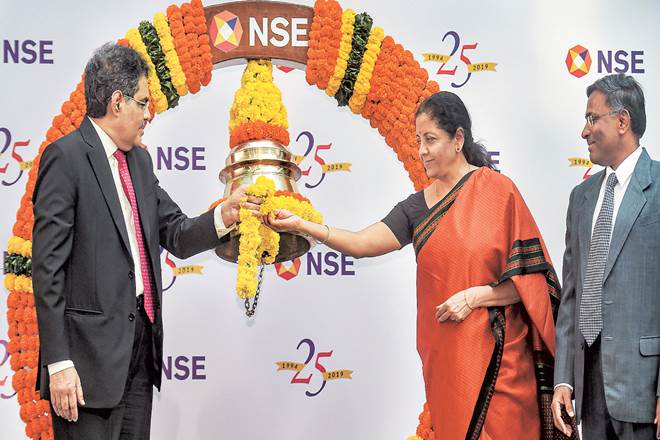
Hindu Business Line
Transaction costs must go down: NSE chief
Bureau| 5 November 2019
Vikram Limaye, MD & CEO of the National Stock Exchange, on Tuesday made a strong pitch to the Centre and SEBI to bring down securities transaction and compliance costs to increase equity penetration in the country.
The number of direct and indirect investors in the equity markets is less than 5 per cent of the population, whereas comparable numbers for emerging markets are in the range of 12-15 per cent. For developed markets, the numbers are as high as 35-40 per cent. This despite the strong growth in the asset management industry over the last 3-5 years, Limaye said at a function to mark 25 years of the exchange, which was attended by Finance Minister Nirmala Sitharaman and SEBI chief Ajay Tyagi..
“I would like to mention a few areas where concerted action from the government, regulators, MIIs and market participants could help us achieve broader market access for investors and issuers,” he said while highlighting the need for simplifying the KYC process and a comprehensive review of institutional participation in equities, equity derivatives and corporate bond markets.
He also wished Jan dhan Yojana-like scheme to open demat accounts using just a bank account and Aadhar. ETF segment needs to be further developed to provide simple and cheaper options for investors, he added.
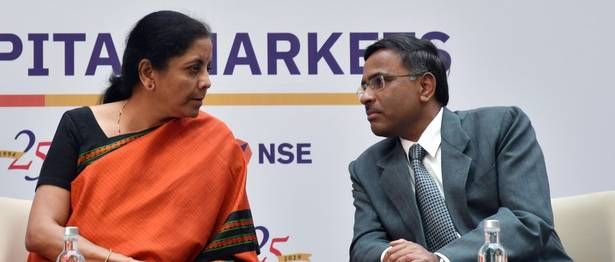
Mint
Sitharaman signals next dose of reforms to target realty sector
Govt is working closely with RBI to address real estate sector’s problems: Nirmala Sitharaman The focus on real estate is part of govt’s broader plan to kick-start economic growth, which has slowed to a six-year low
Nasrin Sultana, Anirudh Laskar|5 November 2019
Mumbai: The government’s next round of reforms is likely to be focused on real estate, with finance minister Nirmala Sitharaman saying that the prevailing slowdown in the sector needs to be addressed soon.
The government is working closely with the Reserve Bank of India (RBI) to address issues faced by the sector, Sitharaman said at an event marking the silver jubilee celebration of the National Stock Exchange of India on Tuesday. “Real estate sector requires a lot more attention because the sluggishness which prevails there has got to be addressed," she said. “The government is very keen and is working very clearly together with Reserve Bank of India (RBI) to see how best we can make necessary tweaks to the existing blocks to help the people who are affected in this one sector which I have not really completely addressed till now."
The real estate industry has failed to recover from the twin shocks of the ban on high-value currency notes in November 2016 and the goods and services tax that was introduced in July the following year.
This has resulted in piling inventory, stagnant-to-falling property prices and dwindling funding for developers.
Real estate projects worth ₹1.8 trillion are stalled across India, according to Anarock Property Consultants.
The focus on real estate is part of the government’s broader plan to kick-start economic growth, which has slowed to a six-year low of 5% in the quarter ended 30 June.
“There are drastic measures that are needed now to infuse liquidity into the sector. If there is zero GST implemented for real estate projects at least for six months, it would make a marked difference. There is an urgent need for active lenders in real estate, with existing banks not lending enough," said Niranjan Hiranandani, co-founder and managing director of Mumbai-based developer Hiranandani Group.
The finance minister said alternative funds have approached the government with proposals to invest in the sector as long as there is some support mechanism available for reviving the real estate sector.
Sluggish demand and the consequent liquidity crunch in the real estate sector have also affected non-bank lenders and banks through increasing slippages in their loan books. Several realty firms are struggling to repay loans.
According to a Fitch Ratings report in October, around $10 billion of development loans are coming up for repayment in the first half of 2020 and this may impact mainstream banks that have lent money to shadow lenders or invested in their bonds. Sitharaman said the government wants to ensure that the crisis in the real estate sector does not spill over to other industries.
Defaults by Dewan Housing Finance Corp. Ltd and Altico Capital have aggravated the issue, making banks excessively cautious in extending loans to housing finance companies (HFCs) and non-banking financial companies (NBFCs).
Private sector lenders, including Yes Bank Ltd and IndusInd Bank, have the largest direct exposure to the commercial real estate sector and would be susceptible to “asset-quality difficulties" if the sector continues to struggle, according to a mid-September Moody’s report.
A study jointly conducted by industry body Ficci, National Real Estate Development Council and consultant Knight Frank has stated that the outlook for the country’s real estate sector in the September quarter has fallen to the level that was recorded during the uncertain times before general elections in 2014.
The number of property developers reporting bankruptcy has doubled during the past nine months, which has added to the woes of NBFCs, according to a 14 October Reuters report.
As of 30 June, 421 developers are under the corporate insolvency resolution process, up from 209 as of September- end of last year, according to data from the Insolvency and Bankruptcy Board of India.
Sitharaman said that India is still dependent on banks for debt functions. “Banks alone cannot serve that cause. And that is why I am very happy that even as I stepped into this ministry, there were enough efforts being made by the bureaucracy—and I credit them for it—for looking at deepening the debt market in India," she added.
In September, Sitharaman announced a ₹20,000 crore special funding boost for stalled projects that are in the affordable and mid-income category, those that are 60% complete and aren’t non-performing assets or in the National Company Law Tribunal.
Essentially, the government cherry-picked the safest options among stressed projects, said property analysts and experts. Also, that is yet to be implemented.
“The money needs to reach the hands of the developers. Demand is slowly coming back in residential, but projects are stuck because there is no liquidity. If the government could encourage banks to start lending again that would be a huge boost" said Ramesh Nair, chief executive and country head of JLL India.
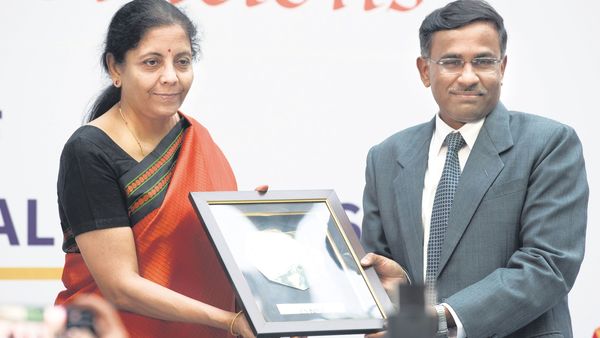
Mint
NSE asks FM, SEBI to lower taxes on market trading
Jayshree P. Upadhyay|5 November 2019
NSE MD&CEO Vikram Limaye said the high security transaction costs are affecting the competitiveness of Indian markets compared to peers
Limaye said lowering the taxes would facilitate an increase in India's weightage in global indices, which would attract more foreign capital
Mumbai: At the silver jubilee celebrations of the National Stock Exchange of India Ltd (NSE), Managing Director and CEO Vikram Limaye pitched for lower taxes on trading in Indian markets.
At the event attended by Finance Minister Nirmala Sitharaman, he said that the high taxation and compliance cost is affecting the competitiveness of Indian markets as compared to other jurisdictions.
"Incidence of multiple taxes from STT, capital gains, stamp duty and GST on capital market transactions is affecting the competitiveness of Indian markets compared to peers," said Limaye.
He made a request to finance ministry and Securities and Exchange Board of India or Sebi to examine the transaction costs.
"I request Honourable Finance Minister and Chairman of SEBI to examine the overall transaction costs including taxes, margins and compliance costs to improve competitiveness of Indian markets," Limaye said.
This, according to Limaye, would facilitate an increase in India's weightage in global indices, which would attract more foreign capital.
India is one of the few jurisdictions which charges capital gains in form on Long Term Capital Gains (LTCG) on trading in Indian markets, this is in addition to Securities Transaction Tax (STT). These taxation on marginal rate adds to increase compliance costs.
To foreign investors this is also a permanent costs as any taxes they pay in India cannot be offset in their home country as they are anyway tax-exempt. Limaye's statement assumes importance in the backdrop of increased pitch for reducing taxes on market trading after the government moved to reduce the taxes on India Inc.
The Finance Minister, however, did not respond to the pitch for reducing taxes on market trading.
Ajay Tyagi, Chairman, Sebi however said that the exchanges should abstain from misusing their oligopolistic position and charge exorbitant fees and charges to market participants.
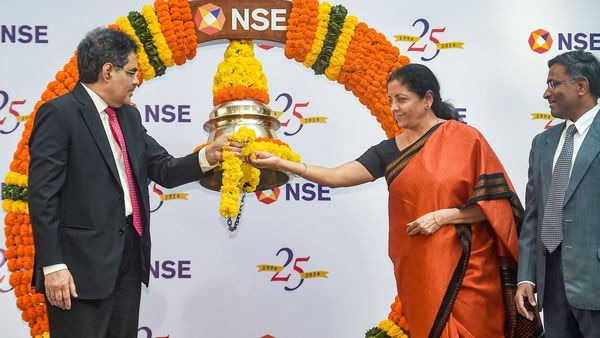
Money Control
NSE CEO urges FM Sitharaman, SEBI, to reduce stock exchange transaction and compliance costs
He also called for the better integration of the corporate bond market with the government’s bond market.
Bureau| 5 November 2019
Vikram Limaye, MD and CEO, NSE, had requested the Finance Minister and SEBI to reduce the overall transaction costs including taxes, margins and compliance costs to improve competitiveness of Indian markets.
Speaking at an event celebrating the 25th anniversary of NSE, Limaye said this would also facilitate an increase in our weightage in global indices which would attract more foreign capital.
Limaye said that the spread of equity trading is very low in India in comparison with its peers.
"Less than 5 percent of the population participates in India's equity markets, whereas the comparable numbers for emerging markets are in the range of 12 to 15 percent and as high as 35-40 percent for the developed markets. " Limaye said that this is despite the strong growth in the asset management industry over the last 3-5 years. "It is therefore imperative that we redouble our efforts in further democratizing our markets," he said.
He said that deep and liquid secondary markets are important to facilitate primary capital raising and that there is a need to improve the breadth and depth of our secondary markets.
Limaye also spoke of the need for strengthening the corporate bond market
"Our equity market structure is robust with wide ranging participation from an entire spectrum of investors and offers great lessons for building a vibrant government and corporate bond market. It is critical for all stakeholders to work towards expediting the development of bond markets to fund the growth aspirations of the country," he said.
"It is imperative that markets take the load off banks in providing long term debt to all types of enterprises ranging from large corporates to SMEs. Government and regulators have been paving the way for this transformation through a series of initiatives. A detailed set of recommendations to develop debt markets have been submitted by various stakeholders, including NSE."
He also called for the better integration of the corporate bond market with the government’s bond market
"Better integration of the government and corporate bond market is essential. The development of the fixed income derivatives market is also critical to enable hedging of interest rate risk and credit risk," he said.
"NSE and its team is committed to partner with the government and the regulators to speed up market development and contribute to India's ambition to take its rightful place in the world's leading economies," he said.
Acknowledging that the real estate sector is in deep trouble, FM Nirmala Sitharaman on November 5 said that though the government has taken measures, more needs to be done to help the sector recover from the downturn.
"The sluggishness in the real estate sector needs to be addressed. Core industries and home buyers will benefit if real estate sector revives. I am glad to say that a lot of funds have approached us as they wish to do something in the real estate sector provided they receive our help,” said Sitharaman.
She also said that several homebuyers are looking at the government for solution to revive the sector, and that government is working towards measures on the same.
Sitharaman also said that India needs a vibrant stock market.
"The interest being shown by the many sovereign funds and pension funds [in our markets] is not only because of our earnings, but because of their trust in the manner which we have organised ourselves," said Sithraman.
Sithraman said that banks alone cannot service all of the country's credit or debt requirements.
Sitharaman also acknowledged the NSE’s inclination to use technology to democratise the access to the stock markets
and take it to the people.
"One can see the tangible benefits due to the use of technology. Camps to inform retail investors about the stock market have been setup in close to 600 districts, 4,500 courses are held on a calendar year-to-year basis to get more people to become players in the stock market.”
She also noted that after the setup of the NSE in 1990s, it has covered nearly 2,000 cities and setup 2 lakh servers to improve access to stock market activity.
Also present at the event was Securities and Exchange Board of India (SEBI) Chairman Ajay Tyagi, who said that though India has seen an exciting and challenging journey in the development of its capital markets, its market cap to GDP ratio is still very low as compared to some developed market.
"Stock exchanges have emerged as the most imp capital market infrastructure. Exchanges need to follow the regulations better than what they preach to companies.” Tyagi also said that exchanges need to refrain from putting an exorbitant fee structure.
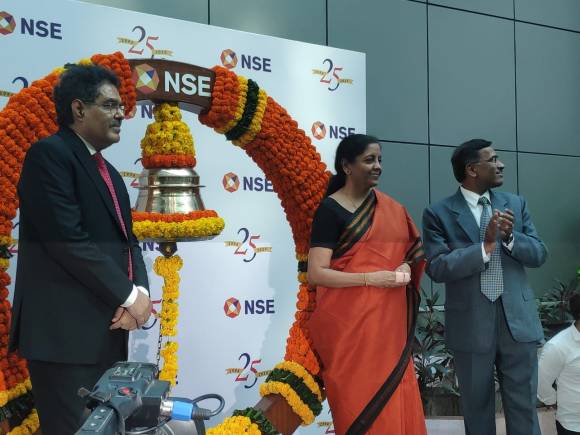
The Hindu
Government, RBI working on realty reforms: FM
Bureau| 5 November 2019
The government is working with the Reserve Bank of India (RBI) to look at possible amendments in the laws to help the real estate sector.
Finance Minister Nirmala Sitharaman, while addressing a capital market event on Tuesday, said that the government had not yet fully addressed the issues faced by the real estate sector, but would soon address the ‘sluggishness’ that is being faced by the sector.
“Government of India is very keen and is working very clearly together with RBI to see how best we can, where necessary, tweak the existing blocks to help the people who are affected in this sector, which I have not really completely addressed till now,” she said, addressing market participants at the National Stock Exchange (NSE).
The real estate sector requires a lot more attention because the sluggishness which prevails there has got to be addressed, she added while highlighting the fact that the government had been announcing various interventions since August to revive the economy in terms of consumption and demand. Interestingly, the Finance Minister further said that many funds had approached the government and were keen to work in the sector, provided proper support mechanisms were put in place.
“There are alternative funds, which are now approaching us saying we would like to do something with you all. So long
as there is some support mechanism available for reviving the real estate sector,” she said.
Ms. Sitharaman further said that the government was giving a lot of importance to the real estate sector because it had a spill over effect on many other sectors, including core industries, and also on the vast number of middle class home buyers.
Deepening debt market
On a different note, she said that her Ministry was working on deepening the debt market and that stock exchanges can play an active role in attracting more retail investors in the segment as currently corporates are dependent only on banks for debt and banks alone cannot service the entire requirement.
Ajay Tyagi, chairman, Securities and Exchange Board of India (SEBI), who was also present on the occasion, said that the development of the bond market required much more attention and a unified approach by all regulators.
“The present NPA position of banks adds urgency to such a development with a view to providing alternative route for raising debt by entrepreneurs. A deep and well-functioning bond market would further add heft to the capital market in India,” Mr. Tyagi said.
The SEBI chairman, however, added a word of caution for stock exchanges and said that while exchanges are for-profit commercial entities, they needed to devote sufficient resources for regulatory functions and should abstain from misusing their oligopolistic position by having exorbitant and unreasonable fee structure.
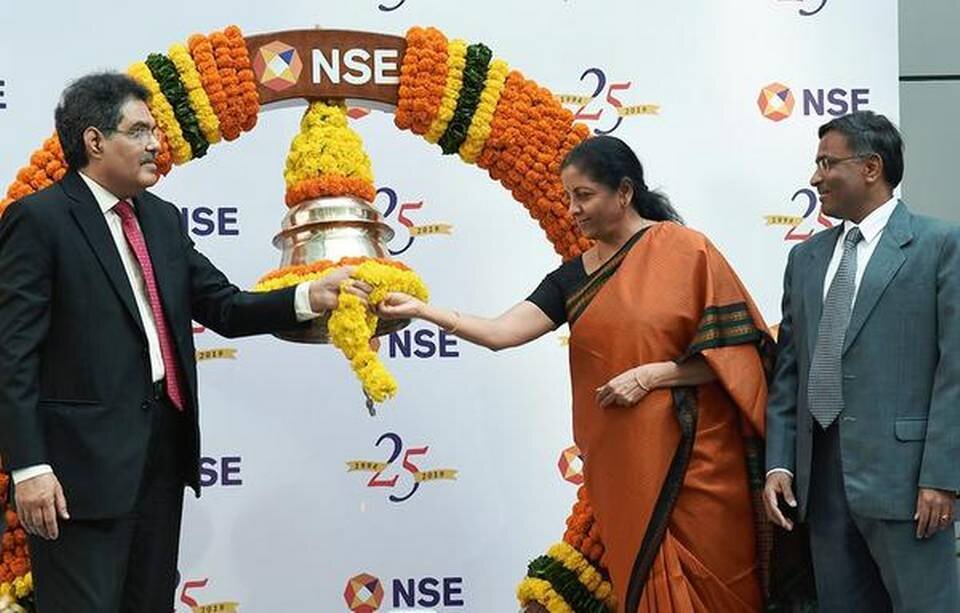
Business Standard
NSE seeks cut in tax on capital market transactions to boost investment
Vikram Limaye said several taxes, including the securities transaction tax and the goods and services tax, are hurting investor participation
Samie Modak | 6 November, 2019
The National Stock Exchange (NSE), the largest bourse in the country, has pitched for a reduction in taxes levied on capital market transactions, in a bid to increase the attractiveness of the domestic market.
Speaking at an event to celebrate the exchange’s 25th anniversary, Vikram Limaye, managing director and chief executive officer, NSE, said several taxes, including the securities transaction tax (STT) and the goods and services tax (GST), are hurting investor participation.
“Incidence of multiple taxes — from the STT, the capital gains tax, stamp duty, and the GST — on capital market transactions is affecting the competitiveness of Indian markets compared to peers. A streamlined tax structure would significantly enhance the attractiveness of our markets and wider participation would enhance liquidity across securities,” Limaye said.
He was sharing the stage with Finance Minister Nirmala Sitharaman and Securities and Exchange Board of India (Sebi) chief Ajay Tyagi.
In recent weeks, the market has been abuzz with speculation that the government is reviewing various capital market taxes such as the long-term capital gains tax (LTCG) and the dividend distribution tax (DTT).
“I request the finance minister and Sebi chairman to examine the overall transaction costs, including taxes, margins and compliance costs, to improve the competitiveness of Indian markets. This would also facilitate an increase in our weightage in the global indices, attracting more foreign capital. Deep and liquid secondary markets are important to facilitate primary capital raising and we need to improve the breadth and depth of our secondary markets,” said Limaye.
When asked if the government was indeed considering a reduction in taxes, Sitharaman refused to comment.
On the sidelines, Tyagi said any reduction in the capital market tax would be a welcome step, adding that he was not privy to any such discussions.
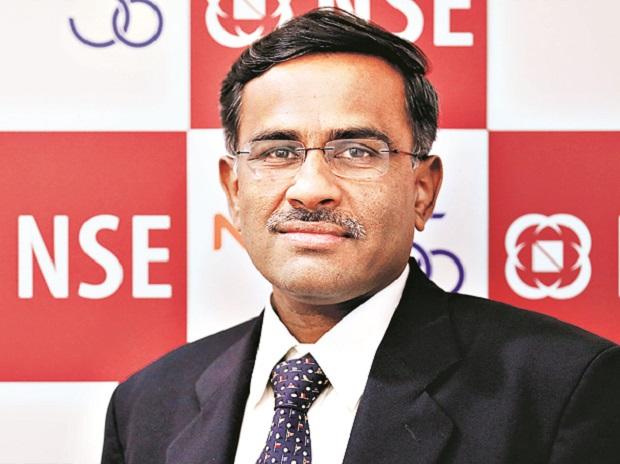
Economic Times
Sitharaman says govt working with RBI to revive real estate sector
Nirmala Sitharaman pointed out that India needs a vibrant stock market.
Ami Shah|5 November 2019
Mumbai: Finance Minister Nirmala Sitharaman on Tuesday flagged concerns over the problems faced by the real estate sector, saying that the ailing sector required a lot of attention. “The government of India is very keen and is working with RBI to see how best we can where necessary tweak the existing laws and help the people in this particular sector (real estate) which is not completely addressed till now,” Sitharaman said at a function to mark 25 years of NSE. She said the sector had a cause and effect impact from the stock market. “We have to say there are alternative funds, which are now approaching us saying we would like to do something with you all so long as there is some support mechanism available for reviving the real estate sector” she added. “Real estate sector requires a lot more attention because the sluggishness which prevails there must be addressed,” she pointed. Sitharaman pointed out that India needs a vibrant stock market, and marking November 3 as retail investors day is a good step, as it brings more retail participants in the market. Speaking at the same event, Ajay Tyagi, Chairman of the Securities and Exchange Board of India (Sebi) said Indian capital markets have an exciting journey. He said the depth of capital markets was an indicator of economic growth of a country. Tyagi pointed out that while ease of doing business is important, investor protection is equally important. Vikram Limaye, Managing Director and CEO of NSE, said that over the years India has emerged as an attractive investment destination. He urged the Finance Minister and Sebi to examine to reduce security transaction costs to improve competitiveness of the market.

Economic Times
Now, FM Nirmala Sitharaman hints at booster dose for real estate sector
The government and Reserve Bank are working to resolve the issues being faced by realty sector. Admitting that realty sector has been left out of the booster measures announced earlier, she said the sector has a spillover effect on many sectors
PTI|6 November 2019
Finance minister Nirmala Sitharaman on Tuesday said the government and Reserve Bank are working to resolve the issues being faced by realty sector.
Admitting that realty sector has been left out of the booster measures announced earlier, she said the sector has a spillover effect on many sectors, especially the core sector.
"The government is very keen and is working very clearly together with the RBI to see how best we can, where necessary, tweak the existing norms to help the people who are affected in the realty sector," she said at an NSE event. It can be noted that after the July budget roiled the market and business sentiment, the government has rolled back many of the tax measures and also went to the extent of drastically cutting corporate tax to 22 percent--making the biggest tax giveaways to the tune of Rs 1.3 lakh crore.
Admitting that the so far announced measures have not helped revive the sentiment in the real estate, she said since August the government has been making various interventions to revive the market and consumption demand. Still there is a lot of work to be done and "one particular sector which I have not touched, but which has a lot of positive impact and also can effect an impact for the stock market, is the real estate sector."
She said many funds are ready to invest but want more policy support.
"There are many alternative funds which are now approaching us saying we would like to do something with you all so long as there is some supporting mechanism available for reviving the realty sector," she said.
It can be noted that since the note-ban in November 2016 and the soon-to-be followed Rera introduction in May 2017 and subsequent rollout of the GST in July 2017, the realty market, which used to thrive on black money all these years, was hit hard and is yet to recover from the triple shocks. The liquidity crisis in the NBFC sector has also played its role.
Deccan Herald
Limaye asks FM to lower taxes to boost investment flows
PTI|5 November 2019
India’s top equity bourse NSE's head Vikram Limaye on Tuesday said a multitude of taxes is making domestic markets uncompetitive, and appealed the Government to reduce the same to help investment flows.
He said the securities transaction tax, capital gains tax, stamp duty and goods and services tax on capital market transactions are hurting India as compared to peer markets.
He made the comments amid a deepening slowdown in economic growth which has plummeted to six-year lows and a slew of measures being taken by the Government to revive the same. In recent days, there have been conflicting media reports over whether the government is abolishing dividend distribution tax, securities transaction tax and long- term capital gains tax on shares.
"A streamlined tax structure would significantly enhance the attractiveness of our markets and wider participation would enhance liquidity across securities," Limaye said at an event to commemorate NSE's 25 years, in presence of Finance Minister Nirmala Sitharaman.
He said India is full of aspirational small businesses who will be requiring growth capital and the presence of a large pool of investors is a necessary precondition for meeting their aspirations.
"I request the finance minister and chairman SEBI to examine the overall transaction costs including taxes, margins and compliance costs to improve the competitiveness of Indian markets. This would also facilitate an increase in our weightage in global indices which would attract more foreign capital," Limaye said.
He said it is important to enhance institutional participation in markets by giving them seamless access to a variety of products to earn higher returns or manage risks more efficiently.
"A comprehensive review of institutional participation in equities, equity derivatives and corporate bond markets should be undertaken to better align regulation and risk parameters to facilitate greater involvement of pension funds, insurance companies, banks and mutual funds in markets," Limaye said.
He also pitched for a Pradhan Mantri Jan Dhan Yojana (PMJDY) like scheme to open demat accounts to trade in shares, where investors will be able to open accounts just using a bank account and Aadhar number.
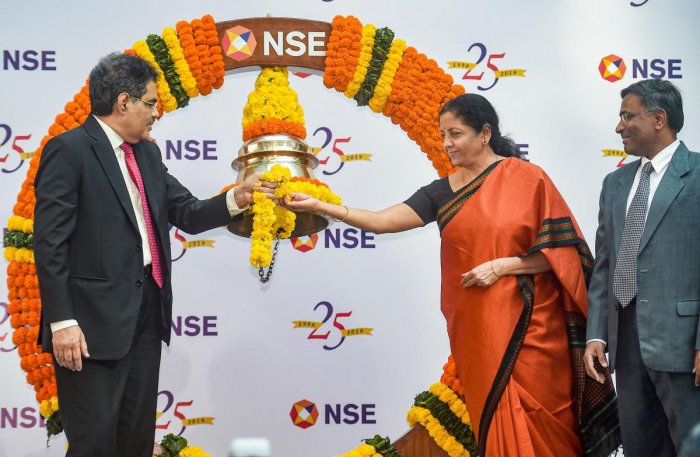
Bloomberg Quint
Real Estate Issues Not Completely Addressed, Says Finance Minister Nirmala Sitharaman Sajeet Manghat
Sajeet Mangat |5 November 2019
Finance Minister Nirmala Sitharaman on Tuesday acknowledged that the government is yet to fully address the liquidity crunch faced by the real estate sector. The government is working very closely with the Reserve Bank of India to tweak existing laws to help the affected people, Sitharaman said at the silver jubilee celebrations of the National Stock Exchange in Mumbai.
India’s real estate developers have been struggling to raise funds as lenders turned selective after default by the IL&FS Group triggered a liquidity crisis in the economy. That, coupled with an economic slowdown, stalled a nascent recovery from the disruption caused by Prime Minister Nagendra Modi’s note ban and a stricter housing law that armed homebuyers against frauds. The developers are now staring at a huge inventory pile-up.
The finance minister emphasised that the real estate sector requires much more attention. The sector has a spillover effect on very many industries, especially the core sector, Sitharaman said, adding that addressing the issues of the sector will also benefit the core industry that supplies materials to the real estate sector.
Distressed homebuyers had approached the government to resolve several unfinished projects. “Several homebuyers
are looking at the government to give them solutions,” Sitharaman said.
India’s real estate sector is now seeing interest from alternative funds, Sitharaman said. “There are many alternative funds which are now approaching us saying we would like to do something with you all so long as there is some supporting mechanism available for reviving the realty sector,” she said.
In September, Sitharaman had announced the creation of a special fund to provide financing to the many stalled affordable and middle-income housing projects in the country.

Bloomberg Quint
Don’t Misuse Your Oligopolistic Position, SEBI Chairman Tyagi Tells Exchanges
PTI |5 November 2019
The equity bourses should refrain from using their "oligopolistic" position and not charge "exorbitant and unreasonable" fees from investors, Securities and Exchange Board of India Chairman Ajay Tyagi said on Tuesday.
Exchanges are the first line of regulation and they should ensure that their conduct on aspects like governance is "above board", he said, while speaking at an event to commemorate the silver jubilee of the NSE, which since its inception has become the market leader overtaking the 144-year-old much older BSE by a huge margin.
"Stock exchanges should abstain from misusing their oligopolistic position by having an exorbitant and unreasonable fee structure," Tyagi said.
It can be noted that the NSE, which commands almost two-thirds of the market by volume, has been mired in a slew of controversies like the co-location case which have exposed chinks in its governance structure.
Tyagi said while exchanges are for-profit commercial entities, they should also devote some resources for their regulatory functions as they are the first level of regulation.
While discharging these functions, the exchanges will also have to ensure that their practices are "above board", the SEBI chairman said, reminding the exchanges that powers come with responsibilities.
The exchanges also ought to be following governance norms which are much better than brokers and the entities being traded on their platform, he said, adding, "the conduct of market infrastructure institutions has to be above board by displaying integrity and work culture."
Tyagi said trust is a very important in business and underlined that while ease of doing business is important, protection of investor interest is "more important".
Though our capital market institutions are of global standards, Tyagi said we have a long way to go, as the overall market capitalisation is only 78 percent of gross domestic product as against more than 125 percent in developed markets like the U.S.
Tyagi said banks' woes with non-performing assets underlines the need for deepening the corporate bond markets a priority as it can help companies access the required capital. Retail investors also need to be given extra focus and be made a part of the capital market story, he said.
Tribune
Sitharaman hints at booster dose for real estate sector
Bureau|5 November 2019
Finance Minister Nirmala Sitharaman today said the government and RBI are working to resolve the issues being faced by the realty sector.
Admitting that realty sector has been left out of the booster steps announced earlier, she said the sector has a spillover effect on many sectors, especially the core sector.
“The government is very keen and is working very clearly together with the RBI to see how best we can, where necessary, tweak the existing norms to help the people who are affected in the realty sector,” she said at an NSE event. Admitting that the so far announced measures have not helped revive the sentiment in the real estate, she said since August the government has been making various interventions to revive the market and consumption demand. Still there is a lot of work to be done and “one particular sector which I have not touched, but which has a lot of positive impact and also can effect an impact for the stock market, is the real estate sector.”
She said many funds are ready to invest but want more policy support.
“There are many alternative funds which are now approaching us saying we would like to do something with you all
so long as there is some supporting mechanism available for reviving the realty sector,” she said.
It can be noted that since the note ban in November 2016 and the soon-to-be followed RERA introduction in May 2017 and subsequent rollout of the GST in July 2017, the realty market, which used to thrive on black money all these years, was hit hard and is yet to recover from the triple shocks. The liquidity crisis in the NBFC sector has also played its role. Officials of the NSE suggested that the government should bring down the securities transaction tax. “Equity penetration is very low in India compared with its peers.... to further expand markets we need to further simplify them,” said Vikram Limaye, MD and CEO, NSE.
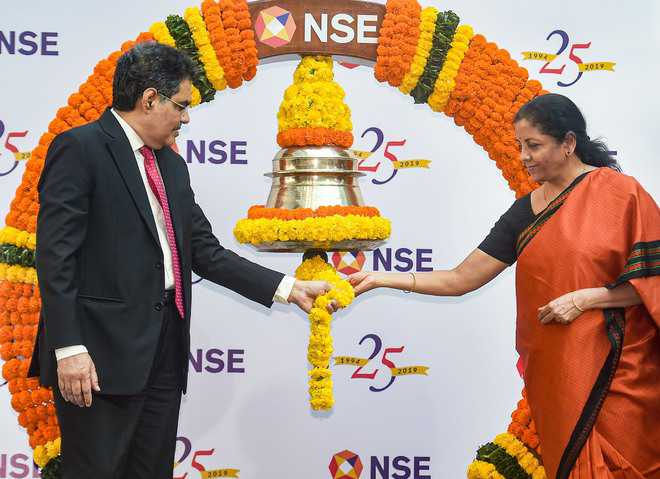
Pro Kerala
NSE - 25th anniversary celebration
Bureau|5 November 2019
Mumbai: Union Finance Minister Nirmala Sitharaman, Sebi Chairman Ajay Tyagi and NSE MD and CEO Vikram Limaye during the 25th anniversary of National Stock Exchange of India (NSE) celebration in Mumbai on Nov 5, 2019.
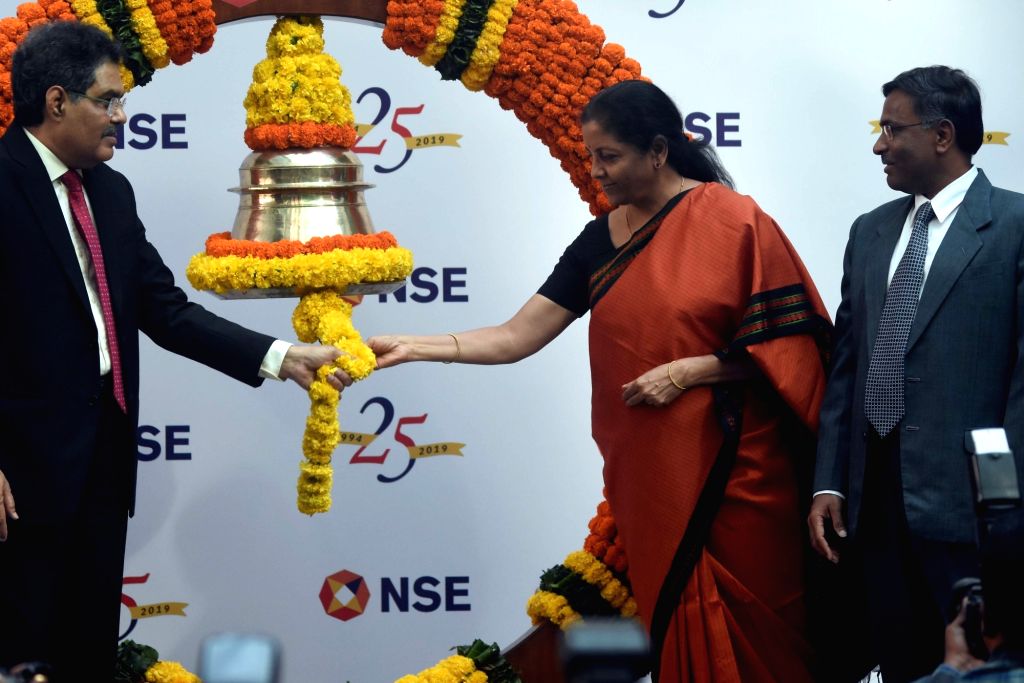
Telegraph
Real estate sops in the works
The real estate sector continued to be affected by the downturn
Bureau|6 November 2019
The government is likely to offer incentives to the real estate sector and is engaged in discussions with the RBI to resolve the issues faced by the industry.
“The government is very keen and is working very clearly together with the RBI to see how best we can, where necessary, tweak the existing norms to help the people who are affected in the realty sector," she said at the silver jubilee celebrations of the National Stock Exchange (NSE) here on Tuesday.
In September, the government had slashed the corporate tax rates in a bid to lift the domestic economy out of a slowdown, marked by a fall in private sector capex and a rise in unemployment.
However, the real estate sector continued to be affected by the downturn.
Sitharaman said many alternative funds were keen to invest in the sector, but they wanted policy support. The segment has a spillover effect on various other sectors such as infrastructure.
“The real estate sector has a spillover effect on very many sectors. Several home-buyers and core industries which supply material are looking up to the government for solutions. They will benefit from a revival of the real estate sector,” the finance minister said.
Sitharaman said though the government had been making various interventions since August to revive consumption and investment demand, more needed to be done. “One particular sector which I have not touched, but which has a lot of positive impact and also can impact the stock market, is the real estate sector’’, she said.
She said a vibrant bond market was required to meet the investment needs of the country.
NSE chief executive officer and MD Vikram Limaye said multiple taxes were affecting the markets. Though the stock exchanges are one of the most sought after destinations, incidence of multiple taxes such as securities transaction tax (STT), capital gains tax and stamp duty was affecting their competitiveness compared with peers.
More reforms
Sitharaman in a separate event here on Tuesday said the government would soon use its strong electoral mandate to usher in the next wave of reforms, and not to miss the bus this time, reports PTI.
Without naming the reform measures unsuccessfully attempted by the Modi government in its first term, she said the
government’s efforts last time were thwarted by the poor numbers in the Upper House.
“I am sure we will now show the commitment for reforms happens fast. That is where the mandate given to Modi 2.0 will help,” Sitharaman said.
Many analysts have been calling for urgent reforms in the factor markets, especially regarding land and labour, to get the economy out of the trough, citing the strong political mandate the government enjoys.
“...I am sure we will now show the commitment for reforms happens fast. That is where the mandate given to Modi
2.0 will help,” Sitharaman said, speaking at The Indian Express’s Adda.
“A streamlined tax structure would significantly enhance attractiveness of our markets and wider participation would
enhance liquidity across securities”.
Limaye urged Sitharaman and Sebi chairman Ajay Tyagi to examine the overall transaction costs including taxes, margins and compliance costs to improve competitiveness.
He said there had been significant improvement in facilitating market access with streamlined registration and KYC process. However, there was a need to further simplify the process. “On the lines of the Jan Dhan Yojana, investors should be allowed to open their demat/brokerage/ investment accounts with just a bank account and Aadhaar,’’ he said.
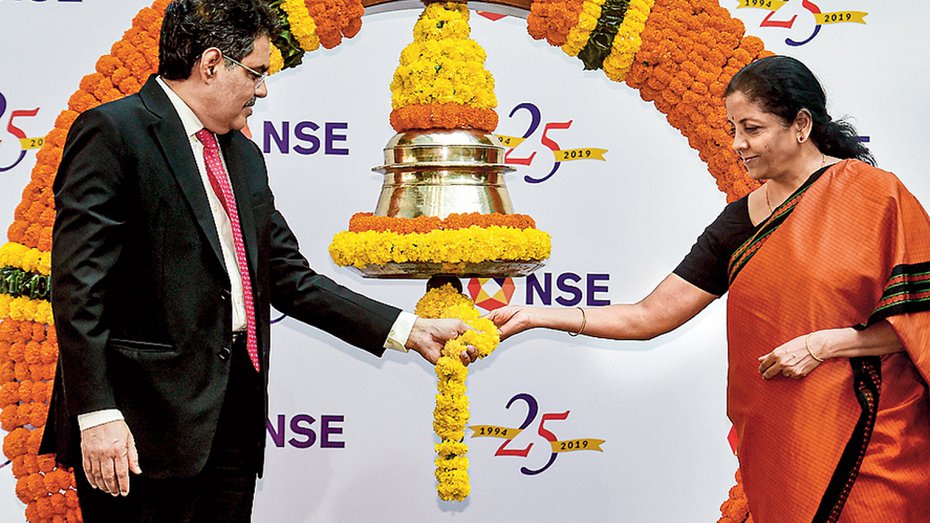
Outlook Money
NSE Requests FM Nirmala Sitharaman to Review Stock Market
Yagnesh Kansara |5 November 2019
Mumbai November 5: At the silver jubilee celebrations of the National Stock Exchange (NSE), MD and CEO Vikram Limaye pitched for lower taxes on trading in Indian markets. At the event attended by Finance Minister Nirmala Sitharaman, he said that the high taxation and compliance cost is affecting the competitiveness of Indian markets as compared to other jurisdictions.
"Incidence of multiple taxes from STT, capital gains, stamp duty and GST on capital market transactions is affecting the competitiveness of Indian markets compared to peers," said Limaye.He made a request to finance ministry and the capital market regulator Securities and Exchange Board of India (Sebi) to examine the transaction costs."I request Honourable Finance Minister and Chairman of Sebi to examine the overall transaction costs including taxes, margins and compliance costs to improve competitiveness of Indian markets," Limaye said.
This, according to Limaye, would facilitate an increase in India's weightage in global indices, which would attract more foreign capital.India is one of the few jurisdictions which charges capital gains in form on Long Term Capital Gains (LTCG) on trading in Indian markets, this is in addition to Securities Transaction Tax (STT). These levies on marginal rate, adds to increase compliance costs.
To foreign investors this is also a permanent cost as any taxes they pay in India cannot be offset in their home country as they are anyway tax-exempt. Limaye's statement assumes importance in the backdrop of increased pitch for reducing taxes on market trading after the government moved to reduce the taxes on India Inc.Experts said, nowhere in the world the foreign institutional players are taxed, nor any levy is laid on them. FPI money is considered as “hot money”, as they are accustomed to bring in a lot of money and take away that money with equal speed. They consider any compliance requirement as hurdle in moving from one market to another. And this is the precise reason, it reduces attractiveness of the Indian market among the peers, they added.
Ajay Tyagi, chairman, Sebi in an oblique reference to the NSE, however said that the exchanges should abstain from misusing their oligopolistic position and levy exorbitant fees and charges to market participants. In India there exists only two stock exchanges, The Bombay Stock Exchange (BSE) and the other is NSE.
The Indian stock market’s daily turnover in the cash segment is around Rs 40,000 crore, out of which NSE has a lion share of 95 per cent. While in the futures and options segment, NSE commands almost monopoly, where the daily turnover averages to Rs 1 Lakh.
All India Radio
FM Nirmala Sitharaman says govt working with RBI to address issues facing realty sector
Bureau|5 November 2019
Finance Minister Nirmala Sitharaman today said, the government and Reserve Bank are working to resolve the issues being faced by realty sector.
Speaking at a special NSE event in Mumbai, she admitted that the realty sector has been left out of the booster measures announced earlier. Ms Sitaraman said, many funds are ready to invest but want more policy support.
The special event was organized in Mumbai to mark the Silver Jubilee of National Stock Exchange. The Finance Minister said, NSE has shown extraordinarily positive inclination and done pioneering work in using technology in democratizing financial markets and making them accessible to the people.
Lauding NSE, the Finance Minister said, the investor outreach programme of the stock exchange has succeeded in bringing in lot more well-informed investors into the markets.

Punekar News
NSE announces November 3rd to be observed as ‘Retail Investor Day’
Bureau|6 November 2019
Mumbai, November 5, 2019: History is being created today at the National Stock Exchange of India Limited (NSE) Bandra-Kurla Complex headquarters in Mumbai, even as Hon’ble Minister of Finance and Corporate Affairs Smt. Nirmala Sitharaman, Hon Sebi Chairman Ajay Tyagi, NSE MD & CEOVikram Limaye and leading dignitaries from India Inc, gathered to commemorate the completion of 25 years of electronic trading of equity, which commenced on Thursday, November 3, 1994. Twenty Five years ago, NSE, world’s first demutualized stock exchange, created a milestone in the history of stock exchanges by establishing widespread national reach for the exchange.
On this auspicious occasion, NSE had organized Closing Bell Ringing ceremony, with Smt Nirmala Sitharaman along with Ajay Tyagi and Vikram Limaye doing the honors of Bell Ringing ceremony, signifying the celebration of 25 years of democratizing Capital Markets in India which has witnessed and achieved high success, offering access to electronic trading of equity asset class to the retail audience in the remotest parts in the country.
Speaking on the occasion, Smt. Nirmala Sitharaman, Hon’ble Minister for Finance and Corporate Affairs said, “I congratulate NSE for completing 25 years of revolutionizing the Indian Capital Markets. The exchange then pioneered a critical role in the development of Indian Capital Markets by launching electronic trading 25 years ago, and now will have an equally important role to play for realizing the national dream of $ 5 trillion economy.”
Ajay Tyagi, Chairman, SEBI said: “I congratulate NSE on this momentous occasion of 25 years of electronic trading of equities. I wish NSE all the success and hope that NSE would continue to play a leading role in the growth of capital markets in the country.”
Vikram Limaye, MD & CEO, NSE said, “NSE has been instrumental in democratising the capital market by launching a unified national market. The exchange provided a platform for improving financial well-being of people and easy access to Capital for all stakeholders. It has also built robust market infrastructure helping Indian markets to be recognized globally. NSE will continue to expand and enlarge the market participant base with its initiatives supporting Indian economy to scale new heights’’.
Amongst those who participated at the historic occasion were Industry leaders, Bankers, Mutual Fund CEOs and CIOs, Intermediaries, Investors and Professionals from Finance sector.
To commemorate the Silver Jubilee celebrations of Electronic Trading of Equity, NSE also announced that here on November 3 would be celebrated as the Retail Investor Day. The Retail Investor Day would be in alignment with NSE’s stated agenda and vision for financial inclusion which has resulted in one of the largest investor education and literacy programs in the country. Starting from schools and colleges to programmes for investors, for women, special groups
like police and armed forces to senior citizens, NSE already covers over 500 districts and over 2500 programs every year.
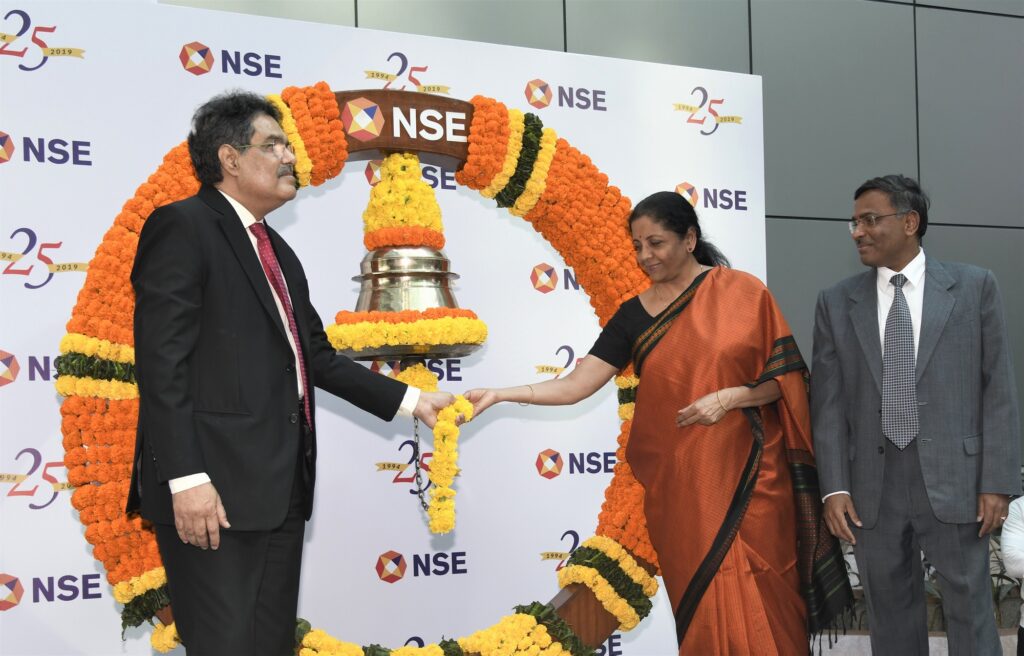
ANI
Money Control
Now, FM Nirmala Sitharaman hints at booster dose for realty sector
She said many funds are ready to invest in the sector but want more policy support. PTI| 6 November 2019
Finance minister Nirmala Sitharaman on Tuesday said the government and Reserve Bank are working to resolve the issues being faced by realty sector.
Admitting that realty sector has been left out of the booster measures announced earlier, she said the sector has a spillover effect on many sectors, especially the core sector.
"The government is very keen and is working very clearly together with the RBI to see how best we can, where necessary, tweak the existing norms to help the people who are affected in the realty sector," she said at an NSE event. It can be noted that after the July budget roiled the market and business sentiment, the government has rolled back many of the tax measures and also went to the extent of drastically cutting corporate tax to 22 percent--making the biggest tax giveaways to the tune of Rs 1.3 lakh crore.
Admitting that the so far announced measures have not helped revive the sentiment in the real estate, she said since August the government has been making various interventions to revive the market and consumption demand. Still there is a lot of work to be done and "one particular sector which I have not touched, but which has a lot of positive impact and also can effect an impact for the stock market, is the real estate sector."
She said many funds are ready to invest but want more policy support.
"There are many alternative funds which are now approaching us saying we would like to do something with you all so long as there is some supporting mechanism available for reviving the realty sector," she said.
It can be noted that since the note-ban in November 2016 and the soon-to-be followed Rera introduction in May 2017 and subsequent rollout of the GST in July 2017, the realty market, which used to thrive on black money all these years, was hit hard and is yet to recover from the triple shocks. The liquidity crisis in the NBFC sector has also played its role.
Newshub Live
Smt. Nirmala Sitharaman Hon’ble Minister of Finance and Corporate Affairs rings Closing Bell at NSE to celebrate 25
years of democratizing Capital Market in India
Nilesh Khandare |November 06, 2019
Mumbai: History is being created today at the "National Stock Exchange of India Limited (NSE)" Bandra-Kurla Complex headquarters in Mumbai, even as Hon’ble Minister of Finance and Corporate Affairs Smt. Nirmala Sitharaman, Hon Sebi Chairman Shri Ajay Tyagi, NSE MD & CEO Shri Vikram Limaye and leading dignitaries from India Inc, gathered to
commemorate the completion of 25 years of electronic trading of equity, which commenced on Thursday, November 3, 1994. Twenty Five years ago, NSE, world’s first demutualized stock exchange, created a milestone in the history of stock exchanges by establishing widespread national reach for the exchange.
On this auspicious occasion, NSE had organized Closing Bell Ringing ceremony, with Smt Nirmala Sitharaman along with Shri Ajay Tyagi and Shri Vikram Limaye doing the honors of Bell Ringing ceremony, signifying the celebration of 25 years of democratizing Capital Markets in India which has witnessed and achieved high success, offering access to electronic trading of equity asset class to the retail audience in the remotest parts in the country.
Speaking on the occasion, Smt. Nirmala Sitharaman, Hon’ble Minister for Finance and Corporate Affairs said, “I congratulate NSE for completing 25 years of revolutionizing the Indian Capital Markets. The exchange then pioneered a critical role in the development of Indian Capital Markets by launching electronic trading 25 years ago, and now will have an equally important role to play for realizing the national dream of $ 5 trillion economy.”
Shri Ajay Tyagi, Chairman, SEBI said: “I congratulate NSE on this momentous occasion of 25 years of electronic trading of equities. I wish NSE all the success and hope that NSE would continue to play a leading role in the growth of capital markets in the country.”
Shri Vikram Limaye, MD & CEO, NSE said, “NSE has been instrumental in democratising the capital market by launching a unified national market. The exchange provided a platform for improving financial well-being of people and easy access to Capital for all stakeholders. It has also built robust market infrastructure helping Indian markets to be recognized globally. NSE will continue to expand and enlarge the market participant base with its initiatives supporting Indian economy to scale new heights’’.
Amongst those who participated at the historic occasion were Industry leaders, Bankers, Mutual Fund CEOs and CIOs, Intermediaries, Investors and Professionals from Finance sector.
To commemorate the Silver Jubilee celebrations of Electronic Trading of Equity, NSE also announced that here on November 3 would be celebrated as the Retail Investor Day. The Retail Investor Day would be in alignment with NSE’s stated agenda and vision for financial inclusion which has resulted in one of the largest investor education and literacy programs in the country. Starting from schools and colleges to programmes for investors, for women, special groups like police and armed forces to senior citizens, NSE already covers over 500 districts and over 2500 programs every year.

Tech Trail
NSE celebrates 25 years of democratizing Capital Market in India
Shriram Shinde|6 November 2019
HISTORY was recently created at the National Stock Exchange of India Limited (NSE) Bandra-Kurla Complex headquarters in Mumbai, even as Minister of Finance and Corporate Affairs, Nirmala Sitharaman, Sebi Chairman Ajay Tyagi, NSE MD & CEO Vikram Limaye and leading dignitaries from India Inc, gathered to commemorate the completion of 25 years of electronic trading of equity, which commenced on November 3, 1994. Twenty-five years ago, NSE, world’s first demutualised stock exchange, created a milestone in the history of stock exchanges by establishing widespread national reach for the exchange.
On this auspicious occasion, NSE had organised Closing Bell Ringing Ceremony, with Nirmala Sitharaman along with Ajay Tyagi and Vikram Limaye doing the honors of Bell Ringing ceremony, signifying the celebration of 25 years of democratising Capital Markets in India which has witnessed and achieved high success, offering access to electronic trading of equity asset class to the retail audience in the remotest parts in the country.
Speaking on the occasion, Nirmala Sitharaman, Minister for Finance and Corporate Affairs said, “I congratulate NSE for completing 25 years of revolutionising the Indian Capital Markets. The exchange then pioneered a critical role in the development of Indian Capital Markets by launching electronic trading 25 years ago, and now will have an equally important role to play for realising the national dream of $ 5 trillion economy.”
Ajay Tyagi, Chairman, SEBI said: “I congratulate NSE on this momentous occasion of 25 years of electronic trading of equities. I wish NSE all the success and hope that NSE would continue to play a leading role in the growth of capital markets in the country.”
Vikram Limaye, MD & CEO, NSE said, “NSE has been instrumental in democratising the capital market by launching a unified national market. The exchange provided a platform for improving the financial well-being of people and easy access to Capital for all stakeholders. It has also built robust market infrastructure helping Indian markets to be recognised globally. NSE will continue to expand and enlarge the market participant base with its initiatives supporting the Indian economy to scale new heights’’.
Amongst those who participated at the historic occasion were Industry leaders, Bankers, Mutual Fund CEOs and CIOs, Intermediaries, Investors and Professionals from the Finance sector.
To commemorate the Silver Jubilee celebrations of Electronic Trading of Equity, NSE also announced that here on November 3 would be celebrated as the Retail Investor Day. The Retail Investor Day would be in alignment with NSE’s stated agenda and vision for financial inclusion which has resulted in one of the largest investor education and literacy programs in the country. Starting from schools and colleges to programmes for investors, for women, special groups like police and armed forces to senior citizens, NSE already covers over 500 districts and over 2500 programs every year.

Democratic Jagat
NSE announces November 3rd to be observed as ‘Retail Investor Day’
Bureau|6 November 2019
Mumbai, November, 2019: History is being created today at the National Stock Exchange of India Limited (NSE) Bandra-Kurla Complex headquarters in Mumbai, even as Hon’ble Minister of Finance and Corporate Affairs Smt. Nirmala Sitharaman, Hon Sebi Chairman Shri Ajay Tyagi, NSE MD & CEO Shri Vikram Limaye and leading dignitaries from India Inc, gathered to commemorate the completion of 25 years of electronic trading of equity, which commenced on Thursday, November 3, 1994. Twenty Five years ago, NSE, world’s first demutualized stock exchange, created a milestone in the history of stock exchanges by establishing widespread national reach for the exchange.
On this auspicious occasion, NSE had organized Closing Bell Ringing ceremony, with Smt Nirmala Sitharaman along with Shri Ajay Tyagi and Shri Vikram Limaye doing the honors of Bell Ringing ceremony, signifying the celebration of 25 years of democratizing Capital Markets in India which has witnessed and achieved high success, offering access to electronic trading of equity asset class to the retail audience in the remotest parts in the country.
Speaking on the occasion, Smt. Nirmala Sitharaman, Hon’ble Minister for Finance and Corporate Affairs said, “I congratulate NSE for completing 25 years of revolutionizing the Indian Capital Markets. The exchange then pioneered a critical role in the development of Indian Capital Markets by launching electronic trading 25 years ago, and now will have an equally important role to play for realizing the national dream of $ 5 trillion economy.”
Shri Ajay Tyagi, Chairman, SEBI said: “I congratulate NSE on this momentous occasion of 25 years of electronic trading of equities. I wish NSE all the success and hope that NSE would continue to play a leading role in the growth of capital markets in the country.”
Shri Vikram Limaye, MD & CEO, NSE said, “NSE has been instrumental in democratising the capital market by launching a unified national market. The exchange provided a platform for improving financial well-being of people and easy access to Capital for all stakeholders. It has also built robust market infrastructure helping Indian markets to be recognized globally. NSE will continue to expand and enlarge the market participant base with its initiatives supporting Indian economy to scale new heights’’.
Amongst those who participated at the historic occasion were Industry leaders, Bankers, Mutual Fund CEOs and CIOs, Intermediaries, Investors and Professionals from Finance sector.
To commemorate the Silver Jubilee celebrations of Electronic Trading of Equity, NSE also announced that here on November 3 would be celebrated as the Retail Investor Day. The Retail Investor Day would be in alignment with NSE’s stated agenda and vision for financial inclusion which has resulted in one of the largest investor education and literacy programs in the country. Starting from schools and colleges to programmes for investors, for women, special groups like police and armed forces to senior citizens, NSE already covers over 500 districts and over 2500 programs every year.
Exclusive News
Smt Nirmala Sitharaman Hon’ble Minister of Finance and Corporate Affairs rings Closing Bell at NSE
Bureau|6 November 2019
Mumbai, November, 2019: History is being created today at the National Stock Exchange of India Limited (NSE) Bandra-Kurla Complex headquarters in Mumbai, even as Hon’ble Minister of Finance and Corporate Affairs Smt. Nirmala Sitharaman, Hon Sebi Chairman Shri Ajay Tyagi, NSE MD & CEO Shri Vikram Limaye and leading dignitaries from India Inc, gathered to commemorate the completion of 25 years of electronic trading of equity, which commenced on Thursday, November 3, 1994. Twenty Five years ago, NSE, world’s first demutualized stock exchange, created a milestone in the history of stock exchanges by establishing widespread national reach for the exchange.
On this auspicious occasion, NSE had organized Closing Bell Ringing ceremony, with Smt Nirmala Sitharaman along with Shri Ajay Tyagi and Shri Vikram Limaye doing the honors of Bell Ringing ceremony, signifying the celebration of 25 years of democratizing Capital Markets in India which has witnessed and achieved high success, offering access to electronic trading of equity asset class to the retail audience in the remotest parts in the country.
Speaking on the occasion, Smt. Nirmala Sitharaman, Hon’ble Minister for Finance and Corporate Affairs said, “I congratulate NSE for completing 25 years of revolutionizing the Indian Capital Markets. The exchange then pioneered a critical role in the development of Indian Capital Markets by launching electronic trading 25 years ago, and now will have an equally important role to play for realizing the national dream of $ 5 trillion economy.”
Shri Ajay Tyagi, Chairman, SEBI said: “I congratulate NSE on this momentous occasion of 25 years of electronic trading of equities. I wish NSE all the success and hope that NSE would continue to play a leading role in the growth of capital markets in the country.”
Shri Vikram Limaye, MD & CEO, NSE said, “NSE has been instrumental in democratising the capital market by launching a unified national market. The exchange provided a platform for improving financial well-being of people and easy access to Capital for all stakeholders. It has also built robust market infrastructure helping Indian markets to be
recognized globally. NSE will continue to expand and enlarge the market participant base with its initiatives supporting
Indian economy to scale new heights’’.
Amongst those who participated at the historic occasion were Industry leaders, Bankers, Mutual Fund CEOs and CIOs, Intermediaries, Investors and Professionals from Finance sector.
To commemorate the Silver Jubilee celebrations of Electronic Trading of Equity, NSE also announced that here on November 3 would be celebrated as the Retail Investor Day. The Retail Investor Day would be in alignment with NSE’s stated agenda and vision for financial inclusion which has resulted in one of the largest investor education and literacy programs in the country. Starting from schools and colleges to programmes for investors, for women, special groups like police and armed forces to senior citizens, NSE already covers over 500 districts and over 2500 programs every year.
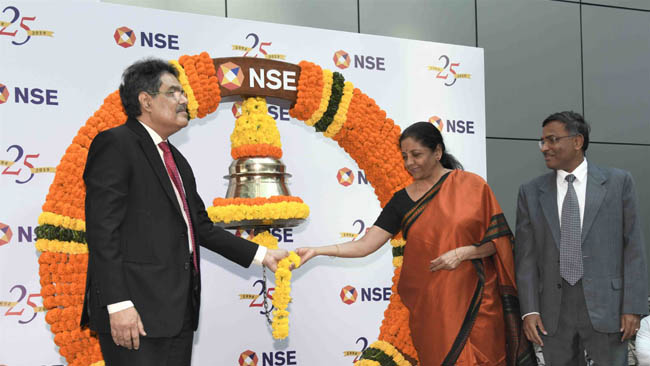
APN News
NSE announces November 3rd to be observed as ‘Retail Investor Day’
Sachin Murdeshwar|6 November 2019
Mumbai: History is being created today at the National Stock Exchange of India Limited (NSE) Bandra-Kurla Complex headquarters in Mumbai, even as Hon’ble Minister of Finance and Corporate Affairs Smt. Nirmala Sitharaman, Hon Sebi Chairman Shri Ajay Tyagi, NSE MD & CEO Shri Vikram Limaye and leading dignitaries from India Inc, gathered to commemorate the completion of 25 years of electronic trading of equity, which commenced on Thursday, November 3, 1994. Twenty Five years ago, NSE, world’s first demutualized stock exchange, created a milestone in the history of stock exchanges by establishing widespread national reach for the exchange.
On this auspicious occasion, NSE had organized Closing Bell Ringing ceremony, with Smt Nirmala Sitharaman along with Shri Ajay Tyagi and Shri Vikram Limaye doing the honors of Bell Ringing ceremony, signifying the celebration of 25 years of democratizing Capital Markets in India which has witnessed and achieved high success, offering access to electronic trading of equity asset class to the retail audience in the remotest parts in the country.
Speaking on the occasion, Smt. Nirmala Sitharaman, Hon’ble Minister for Finance and Corporate Affairs said, “I congratulate NSE for completing 25 years of revolutionizing the Indian Capital Markets. The exchange then pioneered a critical role in the development of Indian Capital Markets by launching electronic trading 25 years ago, and now will have an equally important role to play for realizing the national dream of $ 5 trillion economy.”
Shri Ajay Tyagi, Chairman, SEBI said: “I congratulate NSE on this momentous occasion of 25 years of electronic trading of equities. I wish NSE all the success and hope that NSE would continue to play a leading role in the growth of capital markets in the country.”
Shri Vikram Limaye, MD & CEO, NSE said, “NSE has been instrumental in democratising the capital market by launching a unified national market. The exchange provided a platform for improving financial well-being of people and easy access to Capital for all stakeholders. It has also built robust market infrastructure helping Indian markets to be recognized globally. NSE will continue to expand and enlarge the market participant base with its initiatives supporting Indian economy to scale new heights’’.
Amongst those who participated at the historic occasion were Industry leaders, Bankers, Mutual Fund CEOs and CIOs, Intermediaries, Investors and Professionals from Finance sector.
To commemorate the Silver Jubilee celebrations of Electronic Trading of Equity, NSE also announced that here on November 3 would be celebrated as the Retail Investor Day. The Retail Investor Day would be in alignment with NSE’s stated agenda and vision for financial inclusion which has resulted in one of the largest investor education and literacy
programs in the country. Starting from schools and colleges to programmes for investors, for women, special groups like police and armed forces to senior citizens, NSE already covers over 500 districts and over 2500 programs every year.

Daily Pioneer
FM hints at more sops for housing sector
IANS|6 November 2019
Hinting at a big boost to the realty sector, Finance Minister Nirmala Sitharaman on Tuesday said that the government and the Reserve Bank of India (RBI) are in the process of resolving the issues faced by the real estate sector.
She said that real estate has a spillover effect on many sectors, hence addressing its issues will benefit industries such as cement and steel, who are the major suppliers.
"The government is working together with the RBI to see how best we can tweak the existing norms wherever necessary to help the realty sector," she said at an NSE event.
However, she did not spell out what the measures would be.
Sitharaman also admitted that the issues facing the real estate sector have not been addressed fully.
Since August, the government has been taking various steps to revive the market and consumption demand, the minister said.
Recently, the government cut corporate tax rate to 22 per cent, which involved an outgo of Rs 1.45 lakh crore.
Real estate developers are finding it difficult to raise funds after the default by the IL&FS group that triggered a liquidity crisis in the economy.
This was aggravated by the economic slowdown, which at one hand caused huge inventory pile-up due to lack of demand and also brought ongoing projects to a standstill due to lack of funds.
"There are many alternative funds which are now approaching us, saying we would like to do something with you as long as some supporting mechanism is available for reviving the realty sector," she said.
The Finance Minister said that home buyers are looking up to the government to help complete the stalled projects through policy decisions.
In September, Sitharaman had announced the creation of a Rs 20,000 crore special fund to provide financing to the stalled affordable and middle-income housing projects in the country.



